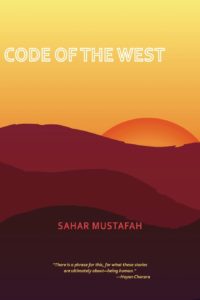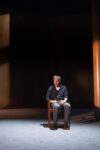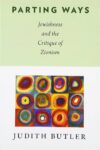Growing up, I was raised in a manner that must be familiar to fellow daughters and sons of the lapsed Catholic: As nothing at all. My father grew up devout, went to church and mass, attended Catholic school, performed altar boy duties, and even contemplated a brief though heartfelt notion of becoming a priest. Who knows how these things happen, but, at some point, the devotion turned sour. I could speculate as to why, but I won’t. That particular rite of passage—the believing in, and the then the non-believing in—and all the passages lit along the way of religious enlightenment for a kid in church were never mine to have. I was out of the club.
This doesn’t stop a nonreligious child from thinking about God, doing good, the afterlife, etc. Even as I contemplated such things on my own, I developed a fascination not just for the ideas behind these various clubs (which is how I viewed spaces of worship), but for the people in them. I can count on one hand how many times I’ve been to church, where, and why, and always as an invitation from someone outside my immediate family. I am not saying this is good or bad. I’m saying that there is a kind of otherness to growing up in America when you lack a belief system beyond basic ethics to claim as your own.
A best friend of mine in high school was Muslim-American. She was, is, Pakistani-American, and she chose not to wear the hijab at that time. I think of Amina as this soft-speaking, but hilarious personality. She fasted during Ramadan, prayed, and sometimes we talked about God, but oftentimes we didn’t. We would hang out — we were kids, and though our two adult worlds have diverged in personal and professional ways, my point is that this time spent with her (in her house and with her family, where Islamic faith couldn’t be extracted from the day-to-day family unit) was important to me as it was one of my first truly positive experiences within an overtly devotional home; I felt the existence of a robust environment near the surface of her family’s interactions that I believe is integral to the Muslim community — any spiritual community — the kind of which my own family had forsaken. I don’t mean to romanticize her; I’m saying I could feel there was a way of living in a family, amongst a community, that was outside my own customary patterns, and that was deep, meaningful, and complicated. Sahar Mustafah’s first story collection, Code of the West, is an ode to the pleasures, and conversely the pain of what it is like to live as a Muslim-American at this particular time in our history, something Amina and I lacked the vocabulary and experience to articulate when we were children.
Born to Palestinian immigrant parents, Mustafah gives us a primarily Palestinian-American perspective. Her stories represent a panoply of characters portraying various Palestinian experiences, both in and outside the homeland, and what remains consistently impressive is Mustafah’s ability to write convincingly not just across gender, but age. Many of her characters are young to middle-aged men coming to terms with the limitations of their lives, as in the titular story “Code of the West”: Riyad, a transient construction worker, exists as one of a handful of men moving from state to state, looking for work, working harder to forget the women they have purposefully left behind. Emad, the little boy in “Masculine Verbs,” realizes he cannot save the plight of his older brother with coins collected from a Palestinian government official. Nizar in “If I’m Not Home” watches his father health wither away from a degenerative brain disease and confronts his mother about her past infidelity with another man. Each plot point is as expansively human as it is singularly Palestinian. Without being overly didactic, the collection feels like Mustafah is saying, “This is what it means to be Palestinian. If you don’t know, you need to pay attention.” In her renderings, the Palestinian experience appears as confusing as it is meaningful, as grounding as it is confounding. There is no one place for a Palestinian, no one true constant. As she takes us to the refugee camps and through the customs lines at the Ben Gurion Airport, there comes a point when you see that the connective tissue of the collection is the repeated collision of two unlikely realms: America and the Middle East.
Midway through the book, Jasir, the protagonist in the story “Wingspan,” notes the scenery of a small town in Michigan moments before pulling away his Chicago Bears cap to nervously run his fingers through his hair: “. . . more American flags suspended over screen doors and others flapping on front yard poles against the brisk autumn winds. He saw one bumper sticker on the back of a pick-up truck that read, IF YOU WANT TO BURN OUR FLAG, WRAP YOURSELF IN IT FIRST.” I love the emblems: The visual representations of what America has become—no longer is it as American as apple pie (a.k.a. as white as a Christian picket fence). Mustafah takes America’s current story down to the bone: A lone Bears cap on a Muslim head pitched against the juggernaut of white patriotism, shamelessly proud and militarily defiant. Here are two representations of the country: One insisting unimaginatively as to what it takes to obliterate the nuances of social difference with blunt force, and the other just trying to get by. Mustafah demonstrates with delicate skill how you maneuver within such a world when you aren’t white, but you are American.
The expanded plot is simple, but telling. Jasir is spending the weekend with his friend Brian and Brian’s aunt and uncle, two unassuming Christians living in a ranch house in the backwoods of Michigan. At an awkward dinner, Jasir (who never corrects Brian’s uncle that his name isn’t Jason) reassures the family that his parents were born just ten miles away from Bethlehem, where Jesus was born. This portrayal of Palestine diffuses the tension that descends when he says he is of Palestinian decent, not the presumed Greek that is the first guess:
“That’s where all them Jews and Ay-rabs are still fighting over the land.”
Brian’s aunt suddenly looked confused as though she wasn’t sure which was more unsettling — a Jew or an Arab sitting at her table. But her Christian manners never faltered and she insisted Jasir have a third helping of the sweet potato casserole.
***
To say that Mustafah writes from a purely “other” perspective would ignore the fact that most of her stories revolve around extremely familiar, almost mundane domestic conflict. Marital strife is a common theme, arising in the form of divorce, infidelity, and young marriages that are already revealing red flags. These topics seen suddenly new to me, filtered through the perspective of someone who knows all the taboos of a culture grounded in an Islamic belief system, and whose parents, cousins, aunts, and uncles are oftentimes still living in or have left third-world refugee camps and prisons.
Twenty years ago, my mother had fled the sewage stench and corrugated tin roofs when she married my father, a thriving liquor storeowner in Roseland. He would build her a house far from that violent neighborhood in a suburb full of other Arabs who’d never have to go back to curfews and black-outs, and days of eating stale khubuz because you couldn’t get to the baker for fresh bread when the Israelis put up roadblocks, dissecting the camp like vital organs, in search of militants.
How does one reconcile these two worlds, the vast wealth and supposed privilege of America’s freedom, and the besieged Palestine where one is treated as an enemy on the basis of their culture? What does it mean to be the child of a displaced people at war with one of the most famously displaced peoples on the planet? What is right, and what is wrong in a conflict such as this? Mustafah never answers these questions because she can’t. No one can. Her people are the humans that exist in liminal space, their stories an amalgam of daily inconveniences that pile up, brick upon brick after a demolition. The dark pain of the past that remains a reality for thousands in the present casts its long shadow across the pages of this collection.
Is it literature’s job to bring the reader closer to what is universal in human experience, or is it to reveal the decades-long historical logic of larger-than-life political conflict shaping individuals in all their particularity? In these stories, the two are inextricable. For example, Mustafah writes the tender scene between Nizar and his estranged mother with judicial elegance. When he asks her about the lover she had when he was a child, he realizes now that he must see her two ways, a dynamic woman overtaking the simplified image of the purely maternal:
In a way, Nizar had expected her to be undaunted [by the question] — she was a woman who’d never shrunken under a man’s heavy love for her, who’d left her children for hours in front of a television set with bowls of cereal, to be with her lover. In another way, it was profoundly unsettling that she could easily invite him through a portal to a woman’s intimacy and passion — far beyond what his mother should possess in his then child-young eyes. He still couldn’t understand the magnetic pull the other man had on his mother, drawing her away from their family for over a decade.
I see nothing overtly Muslim-American about this passage. Here is the familiar trope of the unfaithful woman common amongst all cultures. But, very specifically so, she is a person who worked around and within the code of Islamic decorum for as long as she could until she couldn’t. She left. The power of this act is greater because she is who she is: A Muslim mother choosing to live in her hometown of Nablus over the suburbs of America.
What I felt most drawn to in this collection were the juxtaposing images of what is both foreign (to me) and deeply familiar, as it was in Amina’s house. Not only are such images found in commonplace visualizations like the Bears cap and the American flags, but the bowls of cereal for the children, then the oonsah (a golden charm) worn by the mother. In the opening scene of “Snake Eyes,” middle-aged Mahmoud “. . . stared at his wife’s gold bangles — her asawar — sitting in the deposit space after the owner of the pawnshop pushed them back through the window.” In the background, behind the glass, are baby shoes, an electric shaver. It’s a moment where Mahmoud finds himself giving up the beauty of his past for the detritus of the present — gambling his wife’s dowry away for cash that never comes. The level of detail dedicated to both of Mustafah’s worlds, eastern and western, is what makes both relatable. Mustafah’s craft is her ability to tie the disparate together as an untidy bow, made more alluring by its imperfectness.
In many ways, it feels as though this collection was made for someone like me. An outsider in my own small way, drawn to the light of a fellow on the outskirts. I cannot claim deep understanding or ownership of the immigrant-American experience, especially the Palestinian-American world, but I am moved by the stories that arise out of my own flawed country, lit up by a past that never fully recedes. Mustafah knows more about this than even I do — she carries the weight of two mighty cultures on her shoulders and in her writing. This kind of storytelling becomes the shared experience between two more foreign entities — not different countries, but writer and reader. Our respective privileges and disadvantages seem to fall away to the power of words, and I am allowed a glimpse into an existence that is both mine and not mine; a pathway of empathy forms.
Jennifer Lynn Christie is a writer living in Bloomington, IN. Her reviews have appeared at Entropy, where she also serves as Contributing Editor. Her stories have appeared in PANK, Memorious, and elsewhere.
This post may contain affiliate links.








